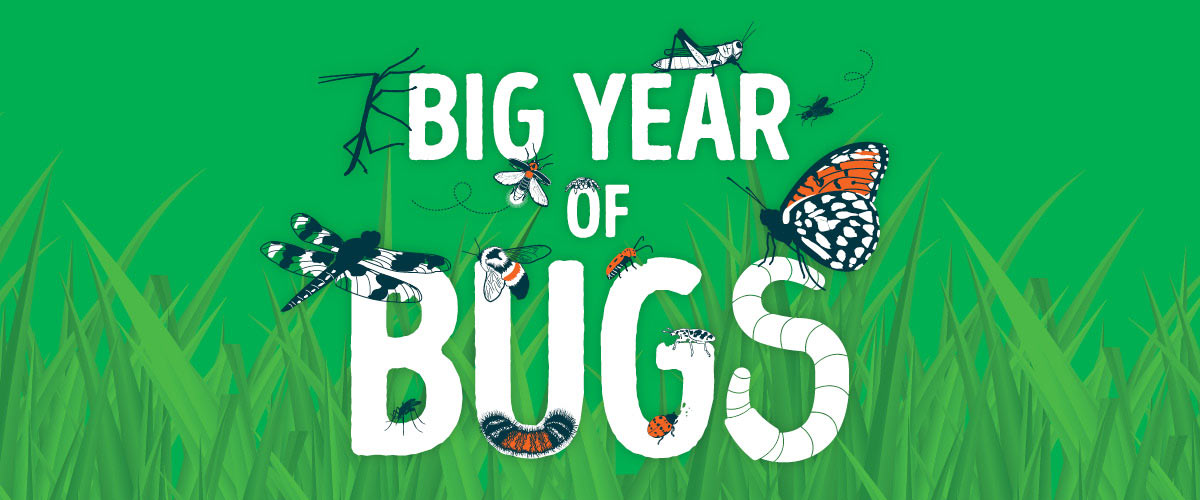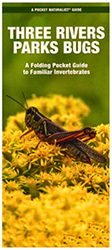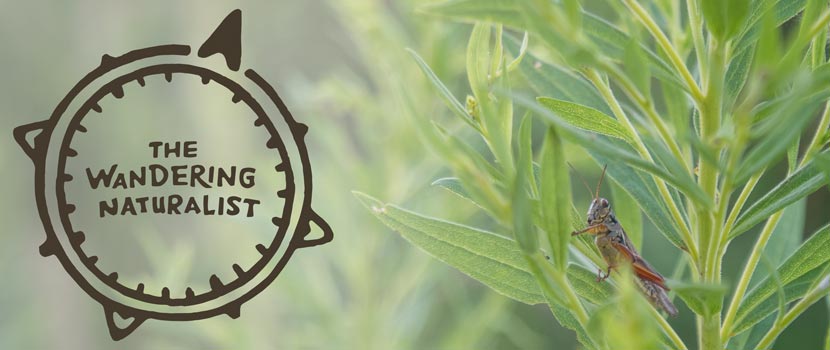
Big Year of Bugs
For 2024, we're celebrating bugs all year long! Join us to learn more about the insect world and what makes these creatures fascinating and awe-inspiring.
Throughout the year, we've created many opportunities for you to join our trained naturalists and bug experts for activities of all kinds. Our speaker series, special events, workshops and more await!
Big Year of Bugs Calendar
Register for upcoming programs and events for Big Year of Bugs!
April–September: Programs & Events
Celebrate bugs with us at the following featured events throughout the Park District! Stay tuned for more details.
- April 27: The Art and Sport of Fly Fishing at Silverwood Park
- June 28: Exploration in Evening Bugs at Silverwood Park
- July 13: Dragonfly Festival at Eastman Nature Center in Elm Creek Park Reserve
- August 3: Summer Pollinator Fest at Gale Woods Farm
- September 14: Bugs, Blankets and Bluegrass at Richardson Nature Center in Hyland Lake Park Reserve
October–December: Art-making Programs
Celebrate the extraordinary world of insects while unleashing your creative spirit! Art and science harmoniously intersect to create connections that explore the beauty of insects, their amazing abilities, and their ecological significance.
Stay tuned for more information!
- October 3: Insects and Weaving at Silverwood Park
- October 12: Fall Galls and Ink Making at Eastman Nature Center in Elm Creek Park Reserve
- November 3: Felted Insect Ornament at Gale Woods Farm
- November 24: Amateur Photography Show & Inspired by Insects Reception at Eastman Nature Center in Elm Creek Park Reserve
- December 7: Paper Wasps and Paper Making at Silverwood Park
- December 7: Decorate a Native Bee House at Lowry Nature Center in Carver Park Reserve
We're kicking off season six of the Wandering Naturalist with episodes about bugs!
In our first three episodes, learn more about the bugs that share your home, how the University of Minnesota Insect Collection is being used to study bugs, and why Three Rivers is celebrating Big Year of Bugs all year long.
Interested in more of our podcasts about bugs? Check out the following podcasts in the archive.
Speaker Series
We kicked off the year with two visits per month from a different Minnesota entomology expert. Learn more about the different sessions below and check out the recordings on our Speaker Series YouTube playlist.
Topics & Speakers
- January 7: Spider Diversity
Learn about the vast diversity of spiders with Chad Heins, associate professor of biology at Bethany Lutheran College. Chad collects and identifies spiders around Minnesota in order to better understand different species' distribution in the state. - January 28: Butterfly Introductions
Learn how butterflies are reintroduced into native habitats with John Moriarty, senior wildlife manager at Three Rivers Park District. John restores and manages wildlife habitats, and has reintroduced a variety of creatures into Minnesota, including regal fritillary butterflies. - February 4: Tree-Boring Beetles
Learn about beetles that can bore into tree branches, twigs and trunks, and how they can affect forest health and tree health, with Dan Comerford, forestry supervisor at Three Rivers Park District. Dan plans reforestation plantings, oversees the tree-pruning program, and manages forest insect and disease outbreaks. - February 18: Mosquitos — Good and Bad
Learn about the positives and negatives of mosquitos in Minnesota with Alex Carlson, public affairs manager, and Nancy Read, data systems coordinator, both at Metro Mosquito Control District, which conducts mosquito research and helps manage mosquitos in the Twin Cities area. - March 3: Insect Diversity
Learn about Minnesota's insect diversity with Robin Thomson, curator of the insect collection at the University of Minnesota's entomology department. Robin maintains the university's vast collection of insects, adding new insect specimens or updating database information. - March 17: Indigenous Relationships with Insects
Learn about indigenous perspective on bugs with Hope Flanagan, community outreach and cultural teacher at Dream of Wild Health, an intertribal, independent nonprofit that serves the Minneapolis-St. Paul Native American community. Hope helps restore health and well-being in the Native community by recovering knowledge of and access to healthy Indigenous foods, medicines and lifeways.
Three Rivers Parks Bugs Guide
 Do you want help identifying bugs in the parks? Our Pocket Naturalist® Guide includes illustrations of insects that are commonly found in Three Rivers Park District. This guide is organized by insect type and folds out to show color images of more than 100 species, from the green darner dragonfly and the pandora sphinx moth to the tumblebug and the crab spider.
Do you want help identifying bugs in the parks? Our Pocket Naturalist® Guide includes illustrations of insects that are commonly found in Three Rivers Park District. This guide is organized by insect type and folds out to show color images of more than 100 species, from the green darner dragonfly and the pandora sphinx moth to the tumblebug and the crab spider.
Purchase a Three Rivers Parks Bugs pocket guide at select nature centers and visitor centers.

